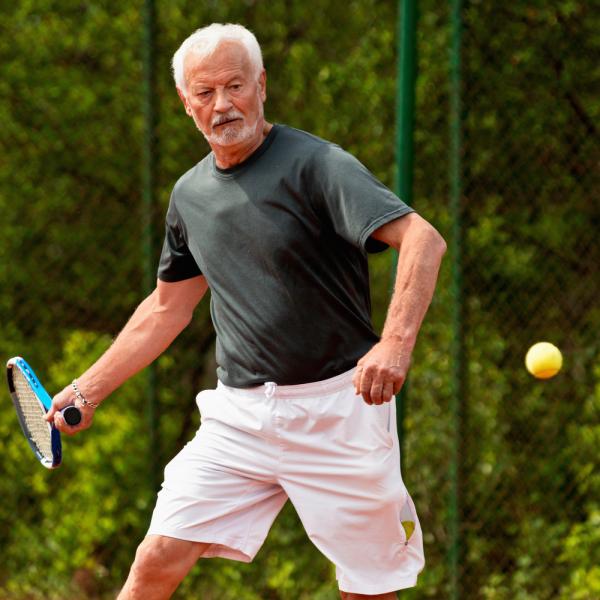A recent health story is currently making the rounds proclaiming that some forms of exercise, as well as participation in three particular racquet sports, are better than others for your overall health and will help you live longer.
These online articles invariably attract our attention. Why? Because they carry headlines that provide the simple solution that everyone craves: the way to better fitness, and finally, a clear, unambiguous and athletic path to a long, healthy life.
Sure, these stories do contain some worthwhile information on how to improve one's fitness. But unfortunately, they are the very definition of health hype.
That's because placing emphasis on specific activities is overblown, and the study these stories are based on has a range of shortcomings. But don't tell those inconvenient facts to headline writers on both sides of the Atlantic, because reporting on the overall efficacy of the research, including the paper's flaws, gets in the way of generating the most online clicks. And sadly, as we know, clicks -- not accuracy -- is often what's most important these days on the internet, even in mainstream journalism.
The misleading health directive headlines -- Time Magazine's: "These 3 Sports Will Help You Live Longer" and the Daily Mail's "Forget that jog: Why squash and tennis are the best way to stay fit in middle age" -- play up the findings of a less-than-rigorous study published in the British Journal of Sports Medicine that failed to make a strong case for associating athletic activities and participation with lifespan.
The study's conclusion was that those involved in racquet sports, swimming and aerobics had the best chances of extending their lives. But the research includes such a range of caveats -- click here for the study; near the bottom, read section starting with "This study was not without limitations" -- and produces several questions, that should turn any discerning reader into a skeptic.
The study examined data from 11 household surveys conducted in England and Scotland between 1994 and 2008. Eight of 15 annual British reports, called the Health Survey for England (HSE), were used; meanwhile, only three Scottish Health Surveys (SHeS) were utilized. Researchers followed the more than 80,000 adult participants for an average of nine years. Just over 1,900 died from stroke or heart disease; in all, there were nearly 8,800 fatalities.
In an interview, the study's participants were asked what activities or sports they engaged in, and how much exercise they got over the previous month. And, excerpting directly from the study itself, the questioning went like this:
"For each positive response participants were asked to specify frequency (‘Can you tell me on how many separate days did you do [activity name] for at least 15 min a time during the past 4 weeks?’), duration (‘How much time did you usually spend doing [activity name] on each day?’) and perceived relative intensity (‘Was the effort usually enough to make you out of breath or sweaty?’)."
 The research eventually produced these results (which, in turn, produced the shoddy headlines): Those who played racquet sports (defined as badminton, tennis, squash) had a 47 percent lower risk of dying than non-exercisers; swimmers, 28 percent lower; and those engaged in aerobics (gymnastics, dance for fitness), 27 percent lower.
The research eventually produced these results (which, in turn, produced the shoddy headlines): Those who played racquet sports (defined as badminton, tennis, squash) had a 47 percent lower risk of dying than non-exercisers; swimmers, 28 percent lower; and those engaged in aerobics (gymnastics, dance for fitness), 27 percent lower.
But what about other activities, like running, cycling and football (classified as American soccer, and rugby)? They didn't correlate so well. And why might that be? While the average age of the participants was 52, sports that younger people embraced wouldn't be as statistically relevant, since strokes, heart disease and death would be, on average, many years away. In essence, this problem skewed these death rates.
As for the other limitations of the study, there were these:
- (1) the data was self-reported, which by definition raises suspicion of its veracity
- (2) participants could, among other inaccuracies, exaggerate how much they exercised, saying they were breathless or worked up a sweat, when that really didn't occur
- (3) the study's location was where racquet sports are popular (notice badminton was included?), hence over-selling the health value of these particular sports
- (4) Of the 15 HSE surveys available, why were only eight used? Did researchers cherry-pick the most supportive data, while leaving other data out?
- (5) an admission from the study's authors themselves: "using mortality as an outcome may miss social and mental health benefits or reductions in morbidity conferred by sports participation."
Yes, that being active and improving one's fitness has more to do that just living as long as possible.
So, back to the misleading headlines. No, racquet sports are not the best ways to stay fit, and to increase your lifespan. They just happen to be popular sports in England and Scotland, meaning that while they're healthy endeavors for some, they're not the answer for everyone.
Now, is it beneficial to play racquet sports? Yes, of course, and no one is arguing otherwise. And compared to sitting on the couch and doing nothing, even better. And the same goes for swimming and aerobics.
But jogging and running, and playing soccer and rugby, and cycling -- and any other activity that gets you moving and raises your heartbeat for a sustained period -- is also beneficial and will help you live a longer and healthier life.
That's the most important message, and not the misleading concept that a handful of activities are the keys to longevity.




